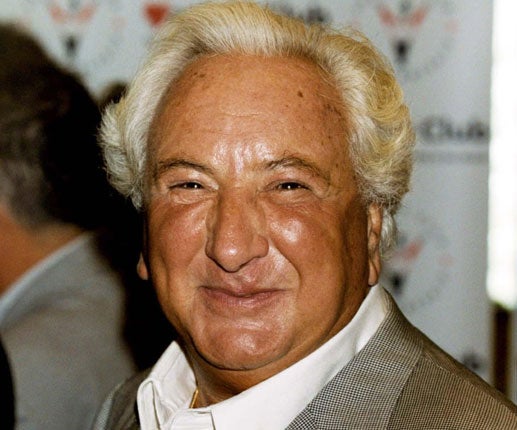Michael Winner's remarkable career was driven by equal parts energy and cheek
No other column in British journalism elicited such genial abuse from readers every week

Michael Winner, who has died aged 77, was a puckish, twinkly-eyed, egomaniacal and populist 20th-century film director who reinvented himself in the 21st century as a restaurant critic and a slightly ambiguous national treasure.
He seldom came across as endearing or loveable. His attitudes tended more towards the grumpy and cantankerous. But his flamboyant irritation about the modern world struck a chord with Middle England. Readers of The Sunday Times, where his restaurant column, Winner’s Dinners, appeared for 15 years, seemed divided into those who valued his bracing opinions on posh food and drink, and those who sought to insult him by writing letters remarking on his portliness, clothing style, floridity of face and profusion (or not) of hair.
No other column in British journalism elicited such genial abuse from readers every week. It was as if an unspoken contract existed, that people could be rude about him in a childish, ad hominem way and he wouldn’t mind at all. If he did mind, he never showed it. He just seemed rather touched to have such an army of readers, appreciative or not. And he achieved a very British mark of success by appearing in a TV commercial for insurance: it established a catch-phrase (“Calm down, dear – it’s only a commercial”) that was used by David Cameron when addressing Angela Eagle, shadow Chief Secretary to the Treasury.
Winner’s remarkable career was driven by equal parts energy and cheek. As a star-struck 14-year-old schoolboy he wrote a column called “Michael Winner’s Showbiz Gossip” in the Kensington Post. At 20, he was writing columns in Showgirl Glamour Review. He charmed his way into interviews with Hollywood titans such as James Stewart and Marlene Dietrich.
In the 1960s he dabbled in the tacky, dirty-realism end of British movie-making, dealing in nudism (Some Like it Cool) rock and roll (Play It Cool) and seedy Notting Hill life (West 11). When American film producers took an interest in him, he seized the chance to work with legendary movie figures: with Marlon Brando in The Nightcomers, a prequel to Henry James’s The Turn of the Screw, in which Brando trussed up Stephanie Beacham in bondage ropes; with Burt Lancaster and Robert Duvall in Lawman; with Robert Mitchum and Sarah Miles in a remake of The Big Sleep; with Sophia Loren in Firepower. And of course with Charles Bronson in Death Wish (1974,) Winner’s most notorious work. The film featured Bronson as a mild-mannered New York architect whose wife is murdered and daughter raped by (black and Latino) muggers, and who becomes, in consequence, an increasingly obsessed vigilante. It was very successful at the box office but raised uncomfortable moral questions. The rape scenes were protracted and shocking, while the retribution scenes had audiences cheering as Bronson blew away yet another bug-eye black guy on the subway, and smiled his granite smile.
A sequel, Death Wish 2, upped the rape-and-violence quotient and was widely criticised. James Ferman, head of the British Board of Film Censors, cut four minutes from the finished print and remarked: “This is about as irresponsible as a film-maker could be in the treatment of rape for purely commercial ends. This director is simply trying to stir up as much controversy as possible because he’s in desperate need of a hit.” Winner made a dozen more movies – his last, Parting Shots, was in 1999 – but his reputation declined steadily.
Winner was a staunch defender of the police. After WPC Yvonne Fletcher was shot outside the Libyan embassy in 1984, he established the Police Memorial Trust to erect public tributes to police officers who have died in the line of duty. Thirty-six memorials have been erected since 1985.
He started writing his restaurant reviews in the mid-1990s and rapidly established himself as a quirky, hard-to-please diner, as prickly about insufficiently fawning service as he was about the actual dishes. His constant companion, after the failure of his relationship to the actress Jenny Seagrove, was Geraldine Lynton-Edwards, whom he’d known since 1957, when she was a ballerina and actress. Photographs of Winner and the sweetly-smiling Geraldine appeared every week in The Sunday Times, like snapshots from an album of late-flowering love. They were finally married in 2011.
Winner’s last years were spent in a large rambling house in London’s Holland Park, illuminated at night by several hundred security lights. Winner claimed that the large electricity bill was worth it since it meant he owned the least burgle-able house in England.
In 2003, he suffered a heart attack which landed him in London’s Cromwell Hospital. It its wake he embarked on a diet which, he claimed, made him lose four stone. It was a typically non-standard, Winner affair, which he later turned into a diet book called The Fat Pig Diet: followers could eat caviar, chocolate cake and Dorito cornbread snacks, provided they ate less of everything.
In Who’s Who, Winner listed his hobbies and interests as “eating, being difficult, making table mats, washing silk shirts” and “doing Pilates badly”. He might have added “turning down honours”. He was offered an OBE in the Queen’s birthday honours in 2006 but rejected it, saying: “An OBE is what you get for cleaning the toilets well at King’s Cross Station.”
Join our commenting forum
Join thought-provoking conversations, follow other Independent readers and see their replies
Comments